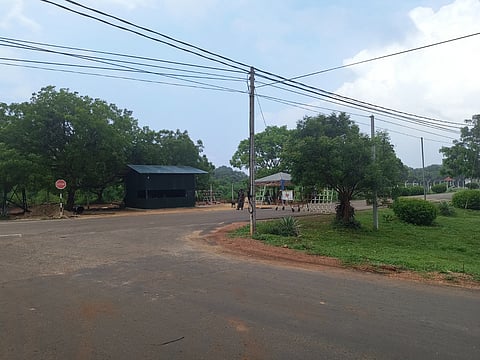

JAFFNA/ MULLAITIVU: November 2024 was the first time in 36 years that 75-year-old Anantharajah Kandiah had visited the Palali-Achuveli road in Jaffna district in Sri Lanka. Ruins of the retired government school principal's home stand on a small piece of land on the side of the road which was opened to the public on November 1, 2024, after being under the army's control for more than three decades.
“I grew up in a hut. I built the house after becoming a teacher by taking a loan against my then monthly salary of LKR 212 (around INR 70),” he said.
In the late 1980s, he and his family had to abandon the house and their belongings after fighting broke out between Tamil militant outfits and the army. When he visited last month, he could only see the building from a distance as fenced lands adjacent to the road remain under army control.
Though he lost his land, Kandiah, a poet who publishes as Kavimani Annaidasan, has done well for himself and his four children are in good positions now.
Selvi Sivaprakasam Ariyakala is not as fortunate. The 61-year-old was also once a teacher whose family was among the hundreds evicted by the army from close to 200 acres of land in Kepapulavu and nearby villages in the Mullaitivu district and shifted to the Menik Farm, a camp for Internally Displaced People in Vavuniya district, during the final phase of the Eelam War in 2009.
She and the other families were largely dependent on the fertile land, which they had cultivated for generations. Their land, like many such occupied by the state during the armed conflict, became a fortified army camp after the war.
A part of the 200 acres has since been released due to the spirited struggles of people like Ariyakala, who camped in protest near the entrance of the army facility from March 2017 to March 2020. However, she and many others are yet to get their own land back.
“We cultivated a variety of trees and the yield was sufficient for sustenance. We were not dependent on anyone. Today, the army is cultivating my land,” said Ariyakala. Several people whose land is under army occupation shared similar complaints with TNIE: that in some places the army is selling the produce from such land, besides running eateries and even salons for the public.
Mahendran Thiruvarangan, an academic from the University of Jaffna, said there is truth to these complaints. He is part of the team that brought out the People’s Land Commission Report (PLCR) in 2020 and explained that civil-military boundaries are being blurred deliberately.
“The military employs local people in these farms and the community becomes dependent on them for livelihood,” he said. He pointed out that this too is an attack on the people’s dignity and does not help the process of healing from the war.
The PLCR demanded, apart from demilitarisation, the return of land to the people and land reforms, an immediate end to military-run commercial ventures such as hotels and farms.
As in the case of enforced disappearances, official numbers on the extent of land taken over by state agencies in the northeastern region of Sri Lanka, where Tamils predominantly live, are hard to come by. Activists and politicians from the region said land is being made inaccessible not only by the military establishment but also by the Department of Forests (DoF) and Department of Archaeology, under the pretext of conservation.
Thurairasa Ravikaran, an MP from Mullaitivu belonging to Ilankai Tamil Arasu Kadchi, said data he obtained after persistent efforts showed that the land under the DoF’s control nearly doubled from 2.2 lakh acres in 2009 to around 4 lakh acres in 2024.
Ravikaran attributes the issue to a failure to fully implement in letter and spirit the 13th amendment to the Sri Lankan constitution, brought in after the signing of the Indo-Sri Lanka Peace Accord in 1987. Arguing that the amendment envisages devolution of powers to the Provincial Councils, including powers over land and policing, he said India has an obligation to press for its full implementation.
Owing to sustained pressure, notable progress has, however, been made in releasing land controlled by the military back to the people, especially after the Maithripala Sirisena-led government came to power in 2015.
Sri Lankan president Anura Kumara Dissanayake, who addressed a massive rally in Jaffna ahead of the parliamentary elections, highlighted the Palali-Achuveli road as his government’s first step and assured lands will be released “gradually” back to the people in consultation with agencies concerned.
Thiruvarangan stressed the need to expedite the process as 15 years have passed since the war. He dismissed as a bogeyman the state’s argument that demilitarisation could lead to resurfacing of armed insurgencies. “The government should realise that by refusing to address these injustices, the reasons that originally led to the armed ethnic conflict are kept alive. That should be of a bigger concern,” he said.
Kandiah supported the Dissanayake-led National People’s Power coalition in the recent elections, like many other Tamils, who are frustrated with the traditional Tamil parties.
While Palali-Achuveli has been opened, there is still a section of a road and significant areas of land, including Kandiah's, in the Valikamam high-security region in Jaffna, which remains inaccessible. “That is my ancestral land. I want to transfer the land to my children and go back at least once to the house I constructed before I die,” he said.
Pointing out that swift action against corruption was the thrust of Dissanayake’s election campaign, Ariyakala asked, “Is the appropriation of our land also not a form of corruption? Will the President take action?.”